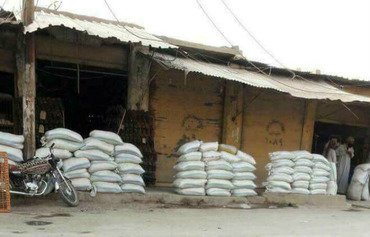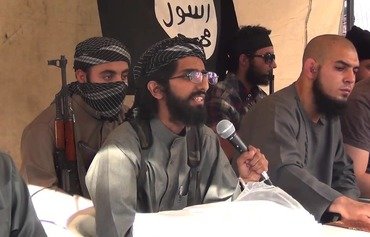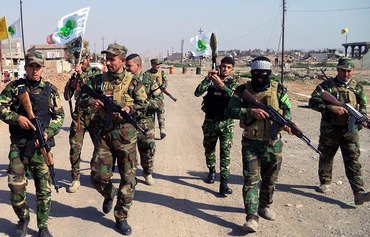Infighting, largely between Iraqi and Uzbek elements, has been roiling the ranks of the "Islamic State of Iraq and Syria" (ISIS) in the group's last bastion in eastern Syria, experts told Diyaruna.
The power struggle between the two camps has given rise to an increasing climate of animosity and distrust within the group, whose fighters are on edge after years of continuous conflict, said Deir Ezzor activist Jamil al-Abed.
ISIS has been riven by internal divisions before, he told Diyaruna, but these rifts have been exacerbated and have become evident to a wider audience as the group comes under increasing pressure in its final stronghold.
"The Iraqi formations within ISIS are strongly asserting themselves as the natural leaders of the group and upholders of the principles upon which the group was built," he said, while the fate of the foreign fighters seems uncertain.
![ISIS foreign fighters engage in fighting in the eastern countryside of Deir Ezzor, the group's last Syria stronghold. [Photo courtesy of Jamil al-Abed]](/cnmi_di/images/2019/01/09/16126-ISIS-fighters-Syria-600_384.jpg)
ISIS foreign fighters engage in fighting in the eastern countryside of Deir Ezzor, the group's last Syria stronghold. [Photo courtesy of Jamil al-Abed]
![ISIS elements are seen here during the ongoing battles in the Syrian province of Deir Ezzor, which borders Iraq. [Photo courtesy of Jamil al-Abed]](/cnmi_di/images/2019/01/09/16125-ISIS-Deir-Ezzor-600_384.jpg)
ISIS elements are seen here during the ongoing battles in the Syrian province of Deir Ezzor, which borders Iraq. [Photo courtesy of Jamil al-Abed]
"Open altercations occurred between the two camps for all to see in Deir Ezzor before the latest attack by the international coalition," al-Abed said.
The situation has deteriorated to the point where each side has its own encampment, he said.
It now seems that the full siege that is currently imposed on them has further antagonized them, and "will usher in an imminent confrontation", he added.
Internal power struggle
As the group loses more of the areas that had been under its control, "each side is trying to control the other and become the sole decision maker", al-Abed said.
Uzbek fighters joined ISIS after its emergence in Syria, he said, noting that the "Uzbek Islamist Movement" later pledged to fight alongside the group in Syria and elsewhere.
Uzbeks have a special ranking within ISIS, as they have managed to expand the group beyond the borders of Syria into parts of Afghanistan adjacent to Turkmenistan and Uzbekistan, he said.
This is important for ISIS, as it "needs to establish a foothold [in these areas] to ensure its survival and expansion after losing control of Syria and Iraq", he said.
Iraqi elements, on the other hand, form the backbone of ISIS, as they represent the old guard of fighters who expanded the group into Syria and Iraq, he said.
Iraqi elements are able to communicate with remaining ISIS formations, he noted, and "for this reason, they have recently played a large role, particularly since the last remaining pocket of the group in Syria is close to Iraq".
Roots of current troubles
Accusations of treason and infighting started to emerge within ISIS around the time of the battle of Kobani in 2014, when the group lost more than 1,000 fighters, according to military expert Wael Abdul Muttalib.
"The foreign and Arab fighters on one side, Iraqi fighters on the other side and the Syrians on yet a third side accused each other of abandoning the battlefield and escaping," he told Diyaruna.
This led to the loss of the city and the death of many fighters, he said.
"Over the last couple of years, a significant number of internal conflicts have been registered [within ISIS], including one that erupted between Chechen and Uzbek elements in 2015," Abdul Muttalib said.
After some infighting among the group's various factions, Iraqi elements were back at the helm following the battle for the Syrian city of al-Raqa, he noted.
"The Iraqis managed to be back on top during and after al-Raqa battle, and took command of the first line of defence again, after they were marginalised by the other Arab and foreign members," he said.
Propaganda conceals divisions
Recent ISIS propaganda has "largely focused on maintaining a united front and eschewing conflict", said Mazen Zaki, director of the new media department at Egypt's Ibn al-Waleed Studies and Field Research Centre.
Most pro-ISIS messaging that is being circulated on social media and posted to online platforms has taken a similar tack, he told Diyaruna, adding that this clearly implies the group is facing internal strife.
Recent messaging also has focused on the execution sentences ISIS has meted out to several elements trying to flee the fighting in Deir Ezzor, and to those opposing its latest fatwas and decisions, he said.
"The ISIS media machine has not only issued official releases denouncing internal fighting, but also ones legitimizing the leadership of Abu Bakr al-Baghdadi," Zaki said.
This would seem to indicate there are several factions with opposing ideologies within the group, he said.

![Uzbek members of ISIS, seen here, have been engaged in a power struggle with the group's Iraqi fighters. [Photo courtesy of Jamil al-Abed]](/cnmi_di/images/2019/01/09/16127-ISIS-Uzbek-fighters-600_384.jpg)







O, God, make their strength between them, divide them, and bring their malice back against the throats of their masters!
Reply3 Comment(s)
ISIS has no religion. Thanks for the valuable info.
Reply3 Comment(s)
ISIS will be defeated at the hands of KDP peshmergas, especially the Rozh peshmergas.
Reply3 Comment(s)